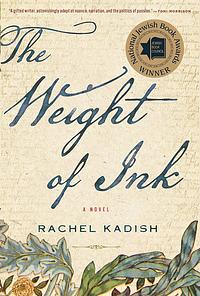Take a photo of a barcode or cover
Well constructed compelling exploration . Great writing.
This was generally fine, as historical novels go. Definitely not as compelling as, say, an A.S Byatt novel. At different times I really wanted to learn more about the characters, but then the backstory or background that I got was largely unfulfilling. Alas. It reminded me that I care little for philosophy but do love libraries and languages.
This really was as good as everyone said it was going to be. I don't think I can add anything else to all the praise that is already out there.
The story unfolds very slowly for my taste. But I like the characters and is interesting to learn about the period and the Jewish culture.
Great writing about well-rounded characters living in completely engrossing worlds separated by hundreds of years and joined by letters.
I found some of the plot twists hard to accept.
And I’m not interested in the philosophical, religious, or Shakespearean aspects of the book.
Read it for book group.
I found some of the plot twists hard to accept.
And I’m not interested in the philosophical, religious, or Shakespearean aspects of the book.
Read it for book group.
Meticulously researched piece of historical fiction that attempts to answer the question, “what if Shakespeare had any equally talented sister?” Enough plot twists and turns to be almost dizzying, but the characters—especially Ester—are complex and worth knowing. An even more special read for those interested in Jewish survivors of the Inquisition and the challenges of post Inquisition Jewish life in England. These interests are not necessary, however, to enjoy this novel.
This is so good. The writing is vivid and evocative, the characters compelling, and the historical setting is fascinating.
There are two timelines. One centers around a young Jewish woman, Ester Velasquez, in 17th century London. She’s an orphan who is taken in by a blind rabbi. Already educated in several languages, she takes a role as his scribe. She becomes fascinated by the intellectual and ethical questions that cross his desk, and is especially drawn to the work of Spinoza, who has been cast out as a heretic by the Jewish community. However, the roles of women are strictly circumscribed, and so Ester cannot write what she wants. She stays invisible, hiding under false identities.
The other timeline takes us to modern times, where two historians have discovered a cache of hidden papers, and are trying to find out who Ester is. Her story is improbable. Other scholars are racing to figure it out and beat them to publication. And the two are very different and don’t work together easily, since one is a stiff, old British lady and the other an impetuous young American man.
The novel is dense, and it moves slowly at first. But it doesn’t take long before the reader is caught up in Ester’s courage and audacity, and the heady atmosphere of 17th century London. There’s so much going on, with religious beliefs always in flux, and then with the plague devastating the city. Survival is always in question.
Some quotes:
< Along the narrow street, youths hauled sacks of sand, an ink vendor cried his wares, saltpeter men hauled stained sacks through a stable door. A girl leading a milch-ass knocked on a door and, when there was no answer, leaned her forehead to the door with a bleary call for any with babes in need of milk. Above the street, signboards mutely announced their wares – one carved in the shape of a mortar and pestle, another in the shape of a barrel of ale, another painted with a picture of crockery, that the unlettered might know where to enter with their coin. And now the road sloped downward beneath her shoes – first the slightest dip, barely perceptible. Then a steeper slope, as though not only her feet but the whole city were rushing toward the river. As she neared the water, something in the air seemed to loosen. Elsewhere in the city the Puritans’ grip might be easing slowly; here, by the river, the impatience for release seemed to pulse faster. >
< She’d been wrong to think the universe cold, and only the human heart driven by desire. The universe itself was built on naught but desire, and desire was its sole living god. >
Intertwining of current day and the past adds believability to this historical fiction. I wonder what current day memories and text will endure over the next 400 years
I really enjoyed this once it got going. At the very beginning I had a hard time caring about the three different characters and trying to figure out why they all mattered, but then found myself deeply involved in their stories and by the time I was done I was surprised to find the book done already, after only 550 pages. LOL. Nicely written, finely drawn characterizations, especially of the two female characters. I've lost interest in several historical fictions lately, I'm glad to have found such a well-done book that was so involving and so good at keeping my interest.

